In this Article:
Try Kanbanchi now
Start your free trial

If you’re looking for a Kanban board-based project management tool, you’ll likely have seen or used Trello. It’s one of the most popular and simplest platforms for creating, allocating, and tracking tasks within projects for dispersed and remote teams.
However, despite being one of the go-to options, the software is not without its limitations. Project management teams frequently search for Trello alternatives that can offer the features that Trello lacks.
Without the right project management software, long-term team productivity can suffer. Fortunately, plenty of paid and free Trello alternatives offer more advanced features and excellent value.
So, let’s go through the top alternatives to Trello for your business, with a comparison of features, benefits, and the value they provide.
Trello is a simple and flexible Kanban board-based visual collaboration tool that helps teams easily organize and work on projects together.
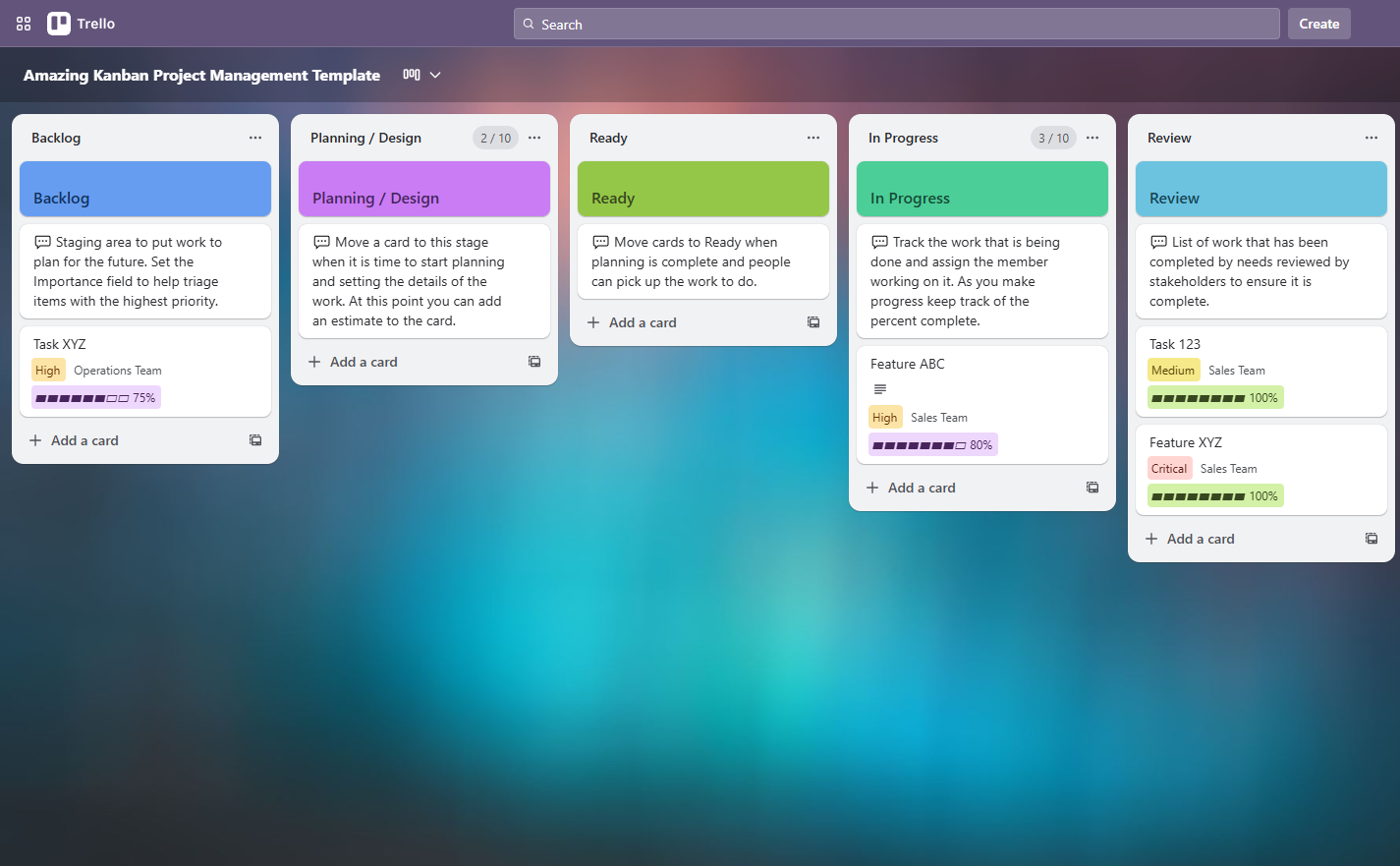
Trello’s simple Kanban-style interface with boards, lists, and cards used for task management.
Used widely by small marketing agencies, freelancers, and small/medium-sized teams within businesses, Trello has been one of the most popular project management tools since it started life in 2011.
Teams use Trello on web browsers and mobile apps to create projects, allocate tasks to individuals/groups, and track progress on each project using a familiar board, list, and card system for easy visualization of task progress.
Because Trello can handle task management, workflow visualization, team collaboration, and personal organization, teams in many fields, from software development to marketing, use the tools to manage projects, as well as individuals for personal to-do lists.
For all of Trello’s popularity, users with various project management needs may seek ideas for a Trello replacement. With so many project management tools on the market now, they are not short of options.
The main reasons for researching Trello alternatives are:
There’s no point switching from Trello to another tool that fails to deliver everything you want or works out considerably more expensive for little benefit.
So, your next step is important. First, you need to have a comprehensive understanding of your own team’s requirements. Next, you need to select from the available Trello board alternatives, which involves careful analysis of the tools’ features, pros and cons, costs, and more.
We’ve prepared an at-a-glance view of your options. To prepare our rundown of the best Trello alternatives, we analyzed user feedback combined with our own experiences of using the software, assessing each tool in the following key categories:
All Trello alternatives included in the list offer some degree of project management organization, team collaboration, customization, automation, and integration. The question is which one best suits your team’s needs?
Read more articles related to Project Management
The following table outlines the recommended use case, user rating, and standout features for each of the main Trello competitors, according to our analysis. Following the table, we do a deeper dive into each solution.
| Tool | Best For | User Rating* | Standout Features |
|---|---|---|---|
| Kanbanchi |
|
4.7 |
|
| Asana |
|
4.4 |
|
| ClickUp |
|
4.7 |
|
| Wrike |
|
4.2 |
|
| Zoho |
|
4.3 |
|
| Smartsheet |
|
4.4 |
|
| Notion |
|
4.6 |
|
| Monday |
|
4.7 |
|
| Jira |
|
4.3 |
|
| Teamwork |
|
4.4 |
|
*User rating is based on G2 user ratings.
Kanbanchi is often regarded as the best Google Workspace Trello alternative. It is a highly focused Kanban-based project management tool that was built for users already embedded in the Google ecosystem.
Combining simple visual task management with deep Google integration, Kanbanchi excels at streamlining workflows and works seamlessly for teams extensively using Gmail, Drive, Calendar, and other tools for daily project management.
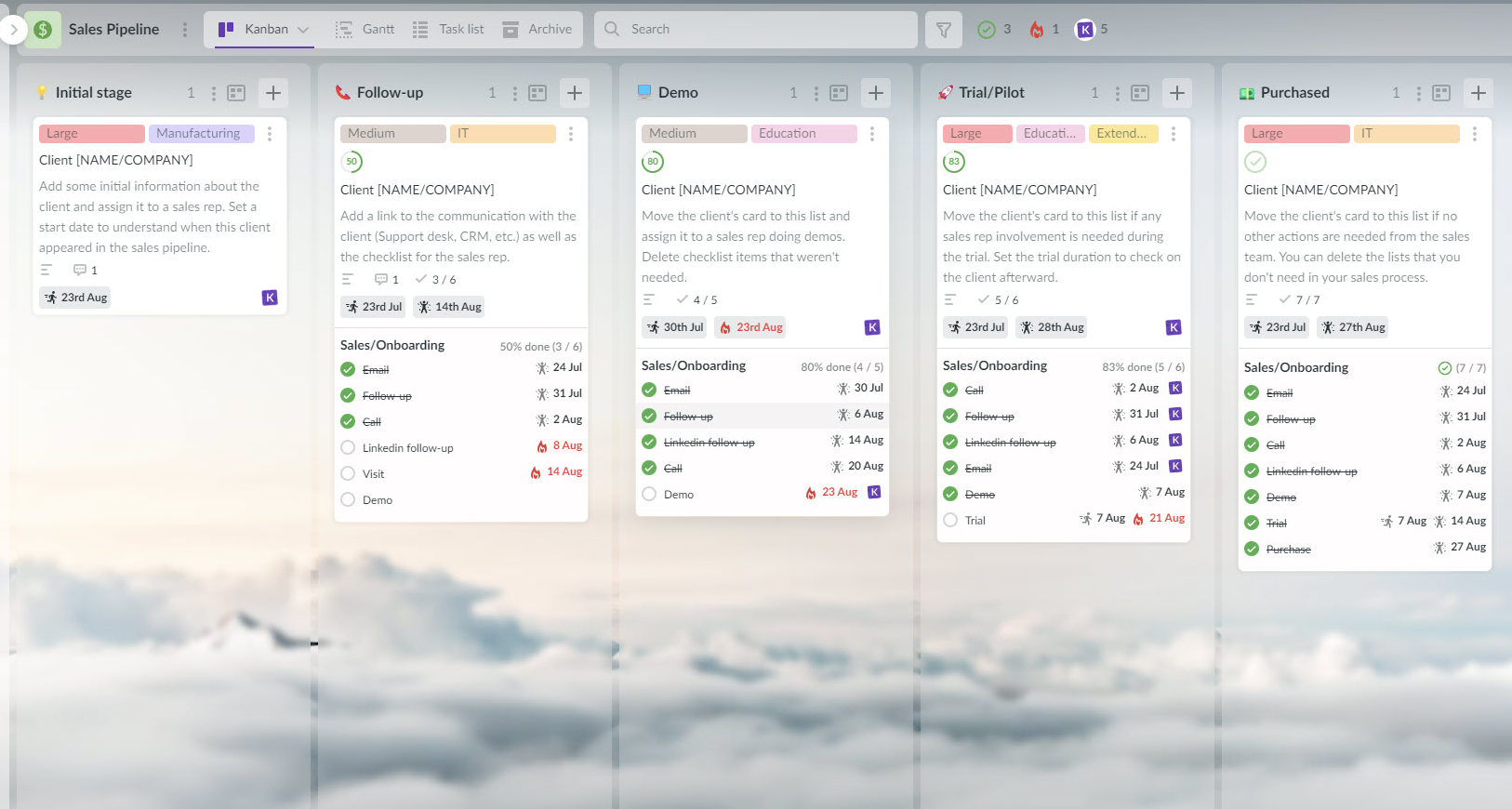
Kanbanchi board showcasing deep integration with Google Workspace tools like Drive and Calendar
Kanbanchi provides a clean, familiar user experience from an uncluttered interface that Google users will be well accustomed to. This makes it excellent for visual task tracking but it works best through a browser rather than on mobile.
Best for: Small to mid-size teams (5-50 users) but supports larger teams and enterprises.
All features with 36 cards per board on the free plan.
Paid plans (billed annually):
Essential: $3.97/user/month
Premium $13.97/user/month
Professional $33.97/user/month
Enterprise from $12.95 (depending on the number of licenses)
(Note: Price per user reduces with team size).
A free trial is available with a free version post-trial, with limited cards.
Educational and non-profit discounts are offered (25% off with annual billing).
VERDICT: Strong value for teams embedded in Google ecosystems and who need a few more advanced features than Trello offers.
Asana is one of the more advanced alternatives to Trello for task and project management. It is feature-rich and can handle more complex projects for larger teams and with many “moving parts”, making it a popular choice for midsize businesses and larger enterprises.
Asana offers detailed task creation features that can reduce repetitive work for users of its browser app, desktop app, and mobile app. Its task list view of projects is the classic Asana view but Kanban and Gantt chart views are also available.
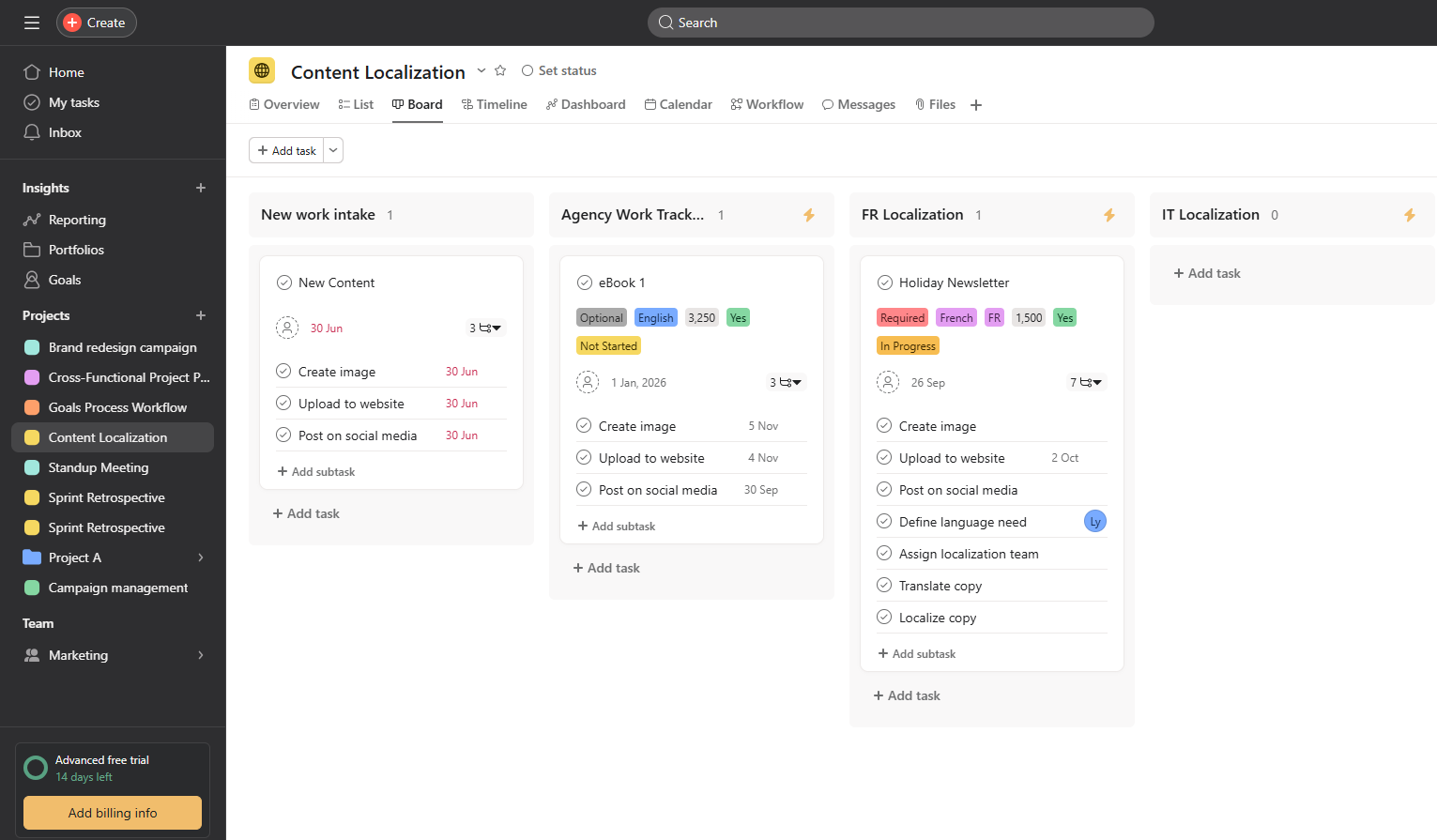
Asana interface displaying task lists and timeline view for structured project management
Asana has an intuitive, clean design with drag-and-drop functionality and a minimal learning curve for its basic features on browser, desktop, and mobile. Teams can get up and running quickly, although more know-how is required for its advanced features, such as Portfolios, custom fields, and reporting.
Best for: Growing teams (10-500 users), cross-departmental project teams, and enterprise.
Basic features for up to ten users on the free plan (Personal).
Paid plans (billed annually):
Starter: $10.99/user/month
Advanced: $24.99/user/month
Enterprise/Enterprise +: Custom pricing
VERDICT: Good value for small and midsize teams but can get expensive for larger teams requiring more advanced features.
ClickUp is another Trello Kanban alternative, offering flexible and customizable project views besides Kanban boards, including List, Calendar, Timeline, Gantt, Box, Workload, and Mind Map views.
ClickUp does a lot more besides, with task management, advanced work planning, collaboration, time tracking, and document storage, making it another of the more advanced alternatives to Trello. Some teams use it as a centralized, all-in-one solution, covering almost all project management needs—which may be overkill for smaller teams looking for simpler tools.
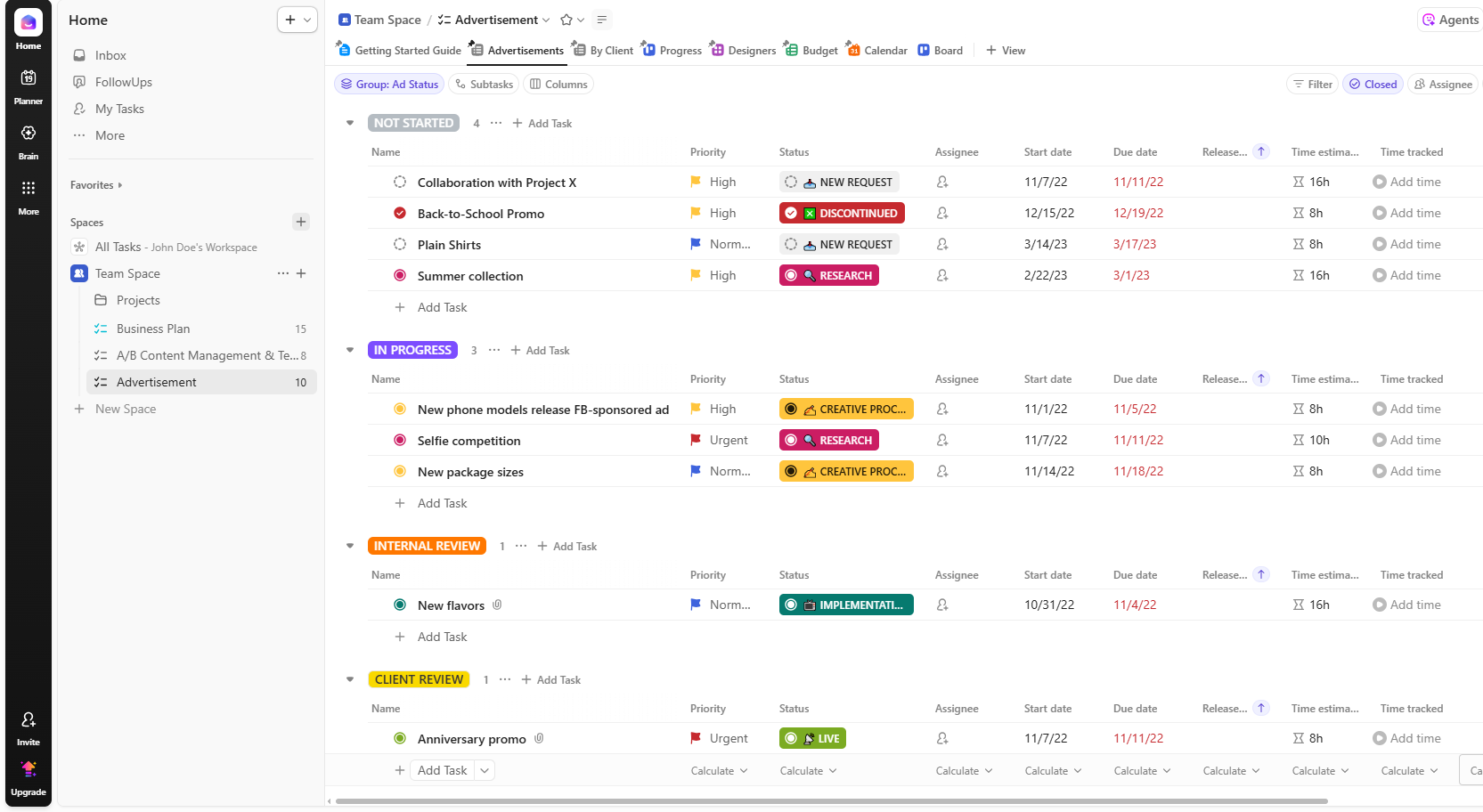
ClickUp’s modern interface with multiple project views and built-in productivity features
ClickUp features a pleasingly sleek and modern interface that can be personalized using widgets, themes, and layout options on web, desktop, and mobile. Its multiple work views provide great flexibility and, while the basic features need little introduction, more advanced features can overwhelm some new users.
Best for: Startups and growing, midsize, and multi-team organizations, as well as enterprises.
Free plan features unlimited tasks, members, project views, docs, chat—but limited storage and features.
Paid plans (billed annually):
Unlimited: $7/user/month
Business: $12/user/month
Enterprise: Custom pricing
VERDICT: Good value for growing organizations and large enterprises looking for a comprehensive, all-in-one project management solution.
Wrike is used by many larger teams and organizations with advanced requirements that extend well beyond the features offered by Trello.
This enterprise-ready solution is a high-level and scalable alternative to Trello, with task management features for complex project planning/execution, a wide range of integrations, and security/compliance features available.
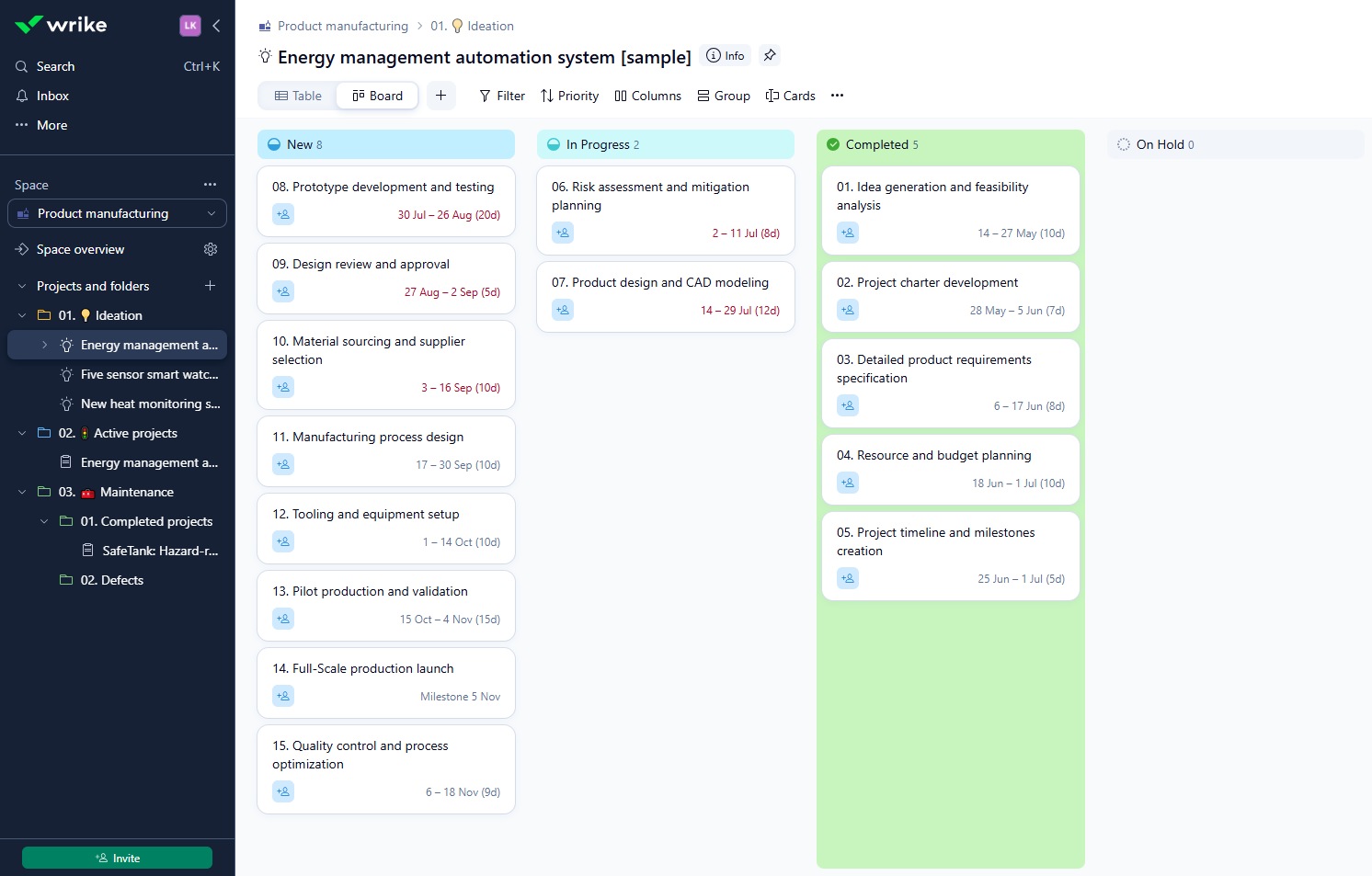
Wrike interface showing Gantt chart, task dependencies, and workload tracking features
Wrike’s customizable interface supports Kanban, Gantt, table, and dashboard views with real-time collaboration, task creation, live editing, and file attachments. However, some users note a steeper learning curve due to its breadth of features.
Best for: Larger teams and enterprises that can make the most of the advanced feature set.
Basic features available on the free plan, such as Board and Table views.
Paid plans (billed annually):
Team: $10/user/month
Business: $25/user/month
Enterprise: Custom pricing
Pinnacle: Custom pricing
A free 14-day trial is available.
VERDICT: A good value Trello competitor for large organizations requiring comprehensive project management tools but less suitable for smaller teams.
For teams using other Zoho software (over 45 other integrated apps in the suite) and looking for robust project planning, task assignment, and collaboration tools from one central platform, Zoho Projects may be a viable alternative to Trello.
Zoho Projects works well for office-based teams seeking a structured, end-to-end project workflow, with milestones, built-in time tracking, issue tracking, resource utilization, and several work views available.
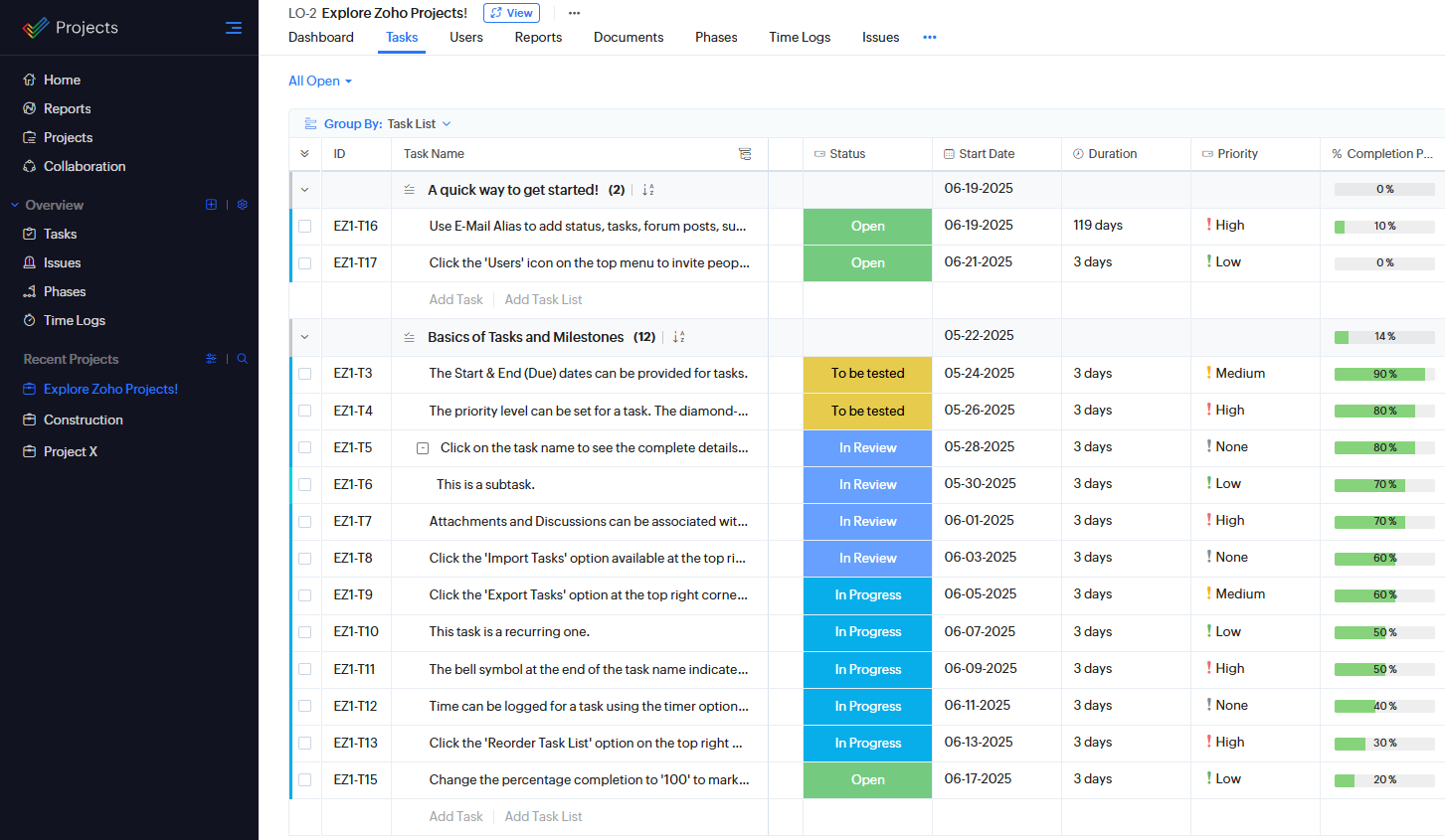
Zoho Projects combining Gantt charts, Kanban boards, and workflow automation for teams
The Zoho Projects interface is feature-rich but may be seen as slightly cluttered for some users compared to other Trello alternatives, like Kanbanchi or ClickUp (especially on mobile).
Best for: Small to medium-sized businesses needing rich features at an affordable price, especially those already using Zoho apps.
The free plan can be used for up to three projects and by five users.
Paid plans (billed annually):
Premium: $4/user/month
Enterprise: $9/user/month
Projects Plus: Custom Pricing
A 15-day free trial is available.
VERDICT: For teams deeply embedded in the Zoho system, Zoho Projects is a cost-effective addition for project management.
For teams accustomed to working in spreadsheet-oriented environments, Smartsheet is a viable Trello alternative. Classic spreadsheet-style work views are the norm but Kanban and Gantt Charts are other options.
Smartsheet provides robust project management and collaboration features well-suited to large organizations, with project planning, budget-tracking, and resource-management options alongside powerful automation features.
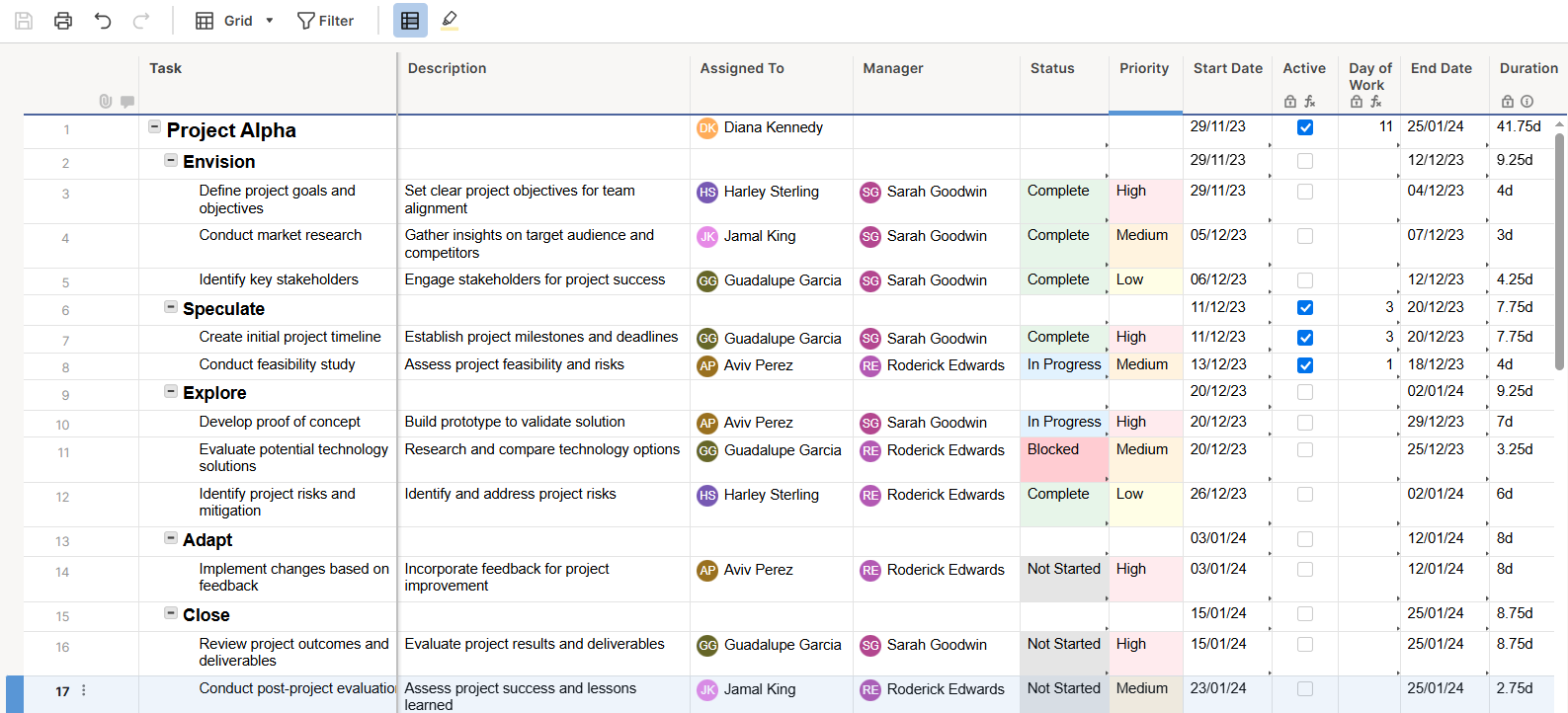
Smartsheet interface with spreadsheet-style task tracking and project timelines
For users already working in Excel/Sheets-style spreadsheet environments, the UI for Smartsheet will have a familiar feel. It is generally considered intuitive, easy to set up and use, and simple to navigate.
Best for: Midsize and large teams in organizations familiar with spreadsheet-based workflow, as well as enterprises with strong governance needs.
No free plan is promoted but, as a legacy option, it’s still available for some users (up to three users and two sheets).
Paid plans (billed annually):
Pro: $9/user/month
Business: $19/user/month
Enterprise: Custom pricing
A 30-day free trial is available.
VERDICT: For spreadsheet-based workflows in mid-to-large-size organizations, a strong and cost-effective alternative to Trello.
One of the best Trello alternatives for a small office or midsize businesses to consider is Notion. This tool combines task management, documentation, knowledge base, wikis, calendars, databases, and note-taking all in one centralized platform.
Although Notion started life as a note-taking and personal organization tool, it has evolved to offer Kanban and other project views with tailored workflows, a library of templates, and a large user community supporting it.
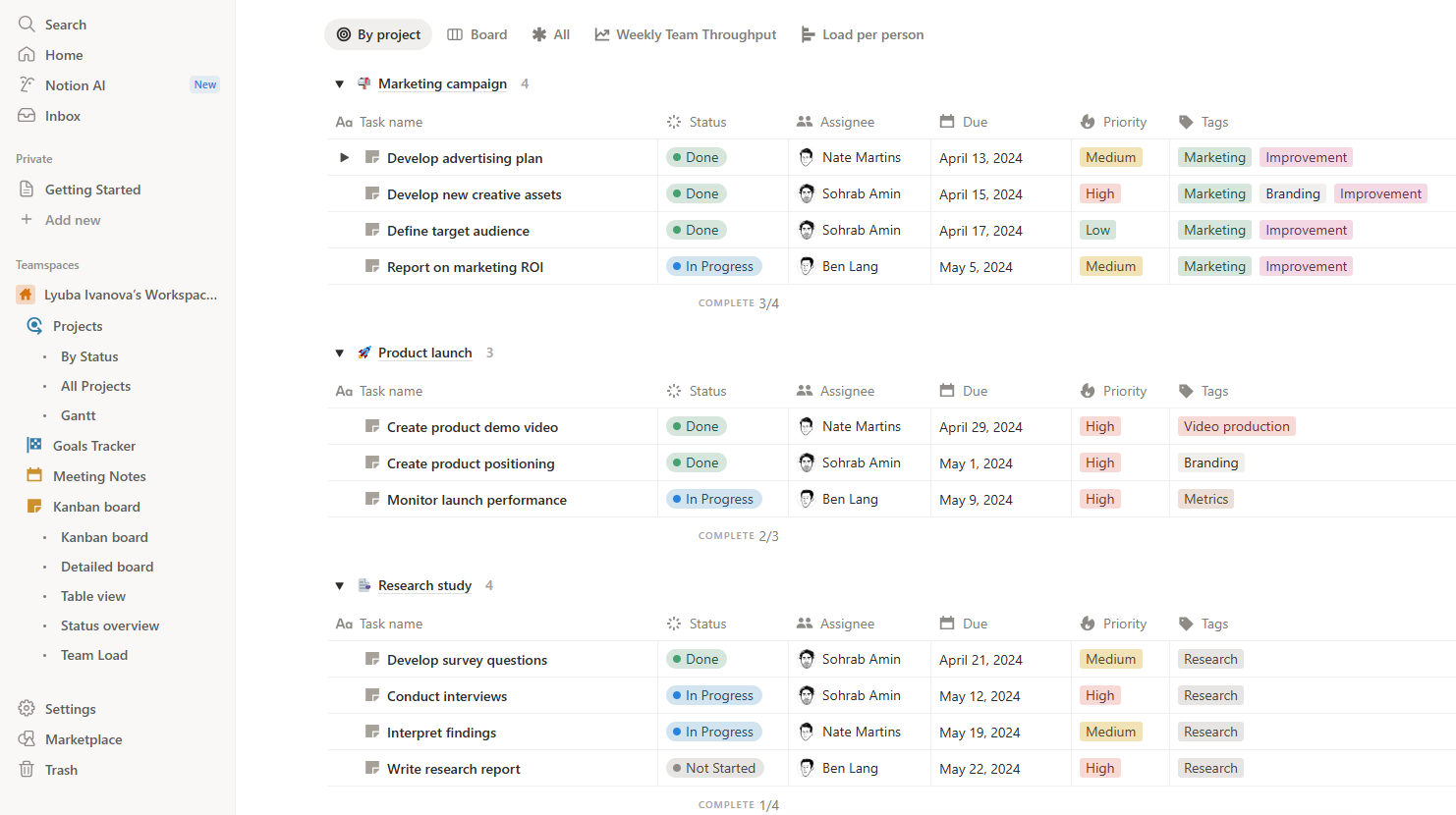
Notion’s flexible modular interface with tasks, notes, and custom databases
Notion has a flexible, modular interface, and its more basic tools are relatively easy to use. It is simple to navigate but building custom pages using the drag-and-drop blocks (text, checkboxes, images, embeds, etc.) might require some training.
Best for: Creative professionals, knowledge workers, and small to midsize teams.
The free plan is aimed at individual professionals with basic project management functionality.
Paid plans (billed annually):
Plus: $10/user/month (free for students and educators using school email)
Business: $20/user/month
Enterprise: Custom pricing
VERDICT: One of the best Trello alternatives for a single operator, not teams. However, small teams may also value its customizability, modularity, bespoke workflows, and AI capability.
Monday is effective Trello replacement software for teams seeking a highly visual, flexible, and user-friendly tool with strong team collaboration features.
With a range of project management features, such as customizable dashboards, time-tracking, resource management, and workflow automation that extend well beyond those offered by Trello, Monday is also highly scalable and suitable for many team/business sizes.
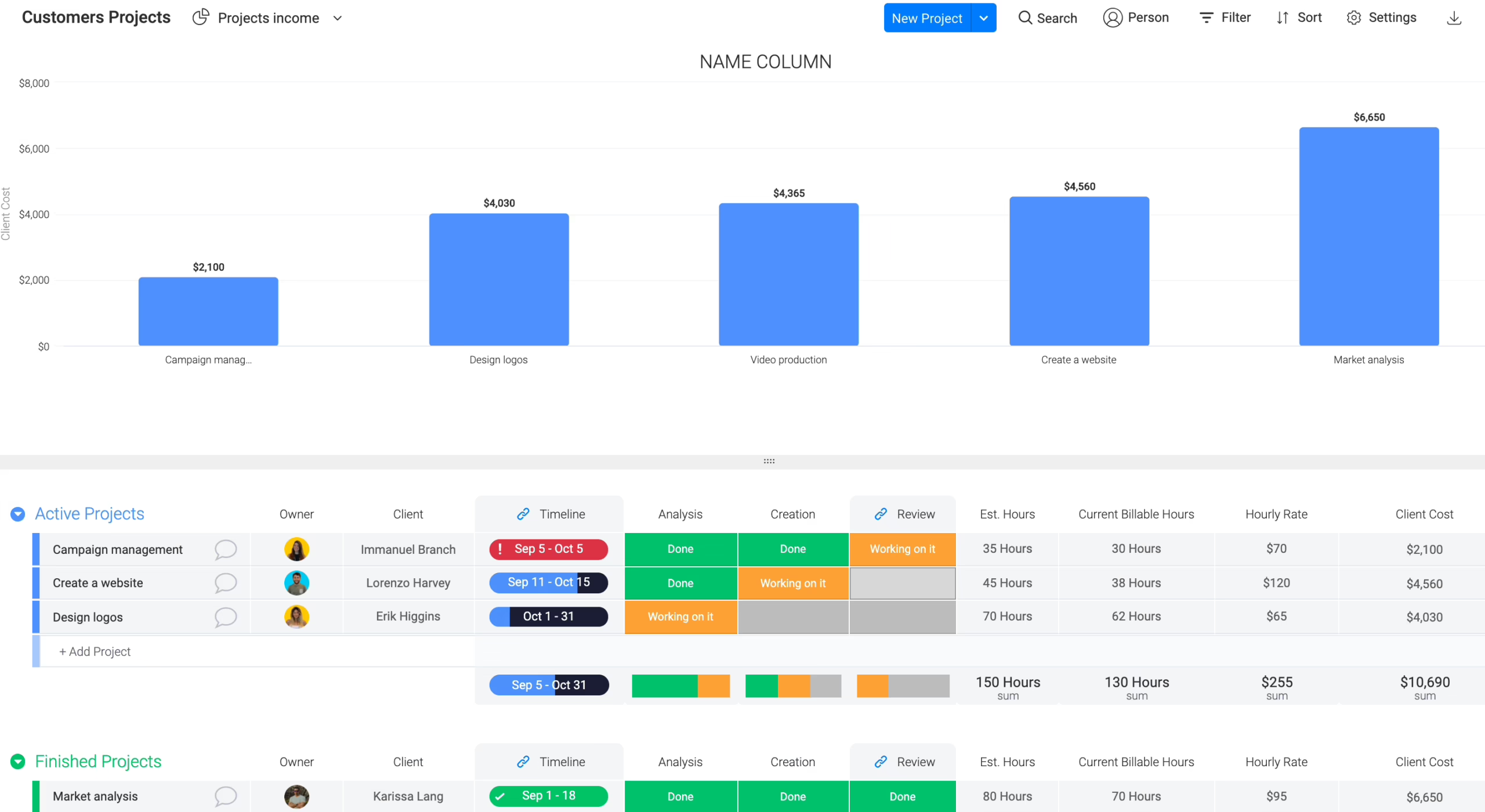
Monday.com dashboard combining Kanban, Timeline, and Calendar views with collaboration tools.
Monday is easy to adopt using its desktop and mobile versions, with an intuitive and attractive interface. The smooth onboarding process reflects its manageable features, which may not be as “heavyweight” as some other Trello alternatives —but are still enough for many organizations.
Best for: Highly scalable from startups and innovators to small and medium-sized businesses and enterprises.
The free plan includes two seats and three boards.
Paid plans (billed annually):
Basic: $9/user/month
Standard: $12/user/month
Pro: $19/user/month
A free trial is available.
VERDICT: Strong value across the board for teams of all sizes, although it may be a little overwhelming for small, non-tech teams/professionals.
Jira, like Trello, is part of the Atlassian stable of team collaboration software products. Originally designed as an issue-tracking solution for software developers, Jira is now used as a project management tool by a range of work teams for managing a range of tasks and projects.
Multiple work views, customizable workflows, and dashboard options make Jira quite versatile but this Trello alternative is still more geared to tech-oriented, software design, and operations teams than general users.
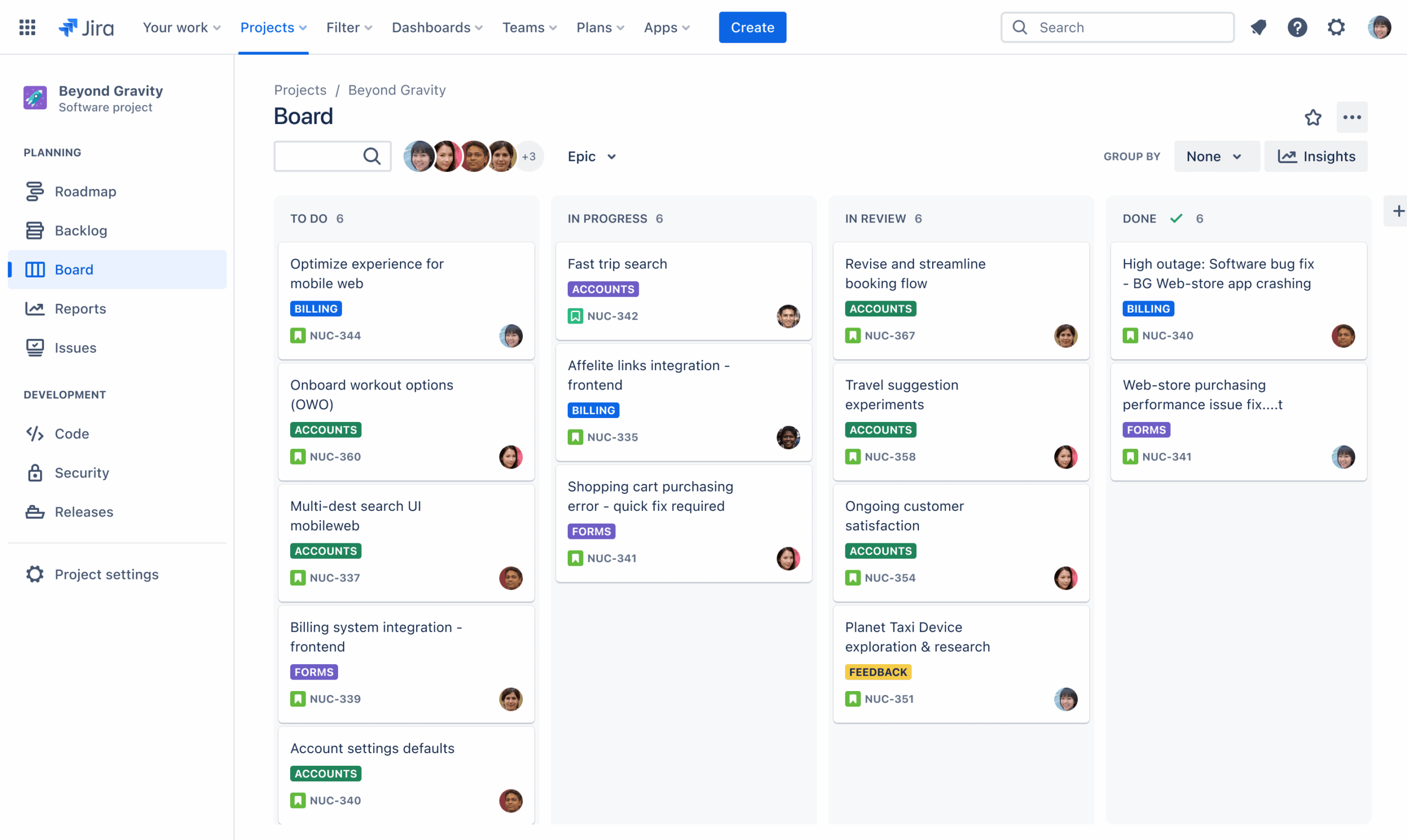
Jira’s agile project management interface with issue tracking and sprint planning.
Jira is a powerful but more complex tool than most other alternatives to Trello included here. New or non-technical users may find it challenging, with a steep learning curve likely for many. Jira is also designed more for desktop than mobile users.
Best for: Tech-savvy freelancers and small teams, small and midsize businesses in software development, and enterprises.
The free plan includes basic features for up to 10 users with 100 automations/month.
Paid plans (billed monthly; annual billing is available as a tiered flat fee based on multiple seats):
Standard: $8.60/user/month
Premium: $17/user/month
Enterprise: Custom pricing
A 7-day free trial is available.
VERDICT: Remains a cost-effective and powerful solution for teams in software development and DevOps but less technical teams may prefer other options.
Teamwork is a Trello board alternative commonly used by agencies, service providers, and large organizations that manage client projects. This software allows them to collaborate closely with clients using portals and other tools.
The tool’s time tracking, invoicing, customization, and security capabilities are also designed for organizations that need wider-reaching features than Trello but may be overkill for smaller organizations with simpler requirements.
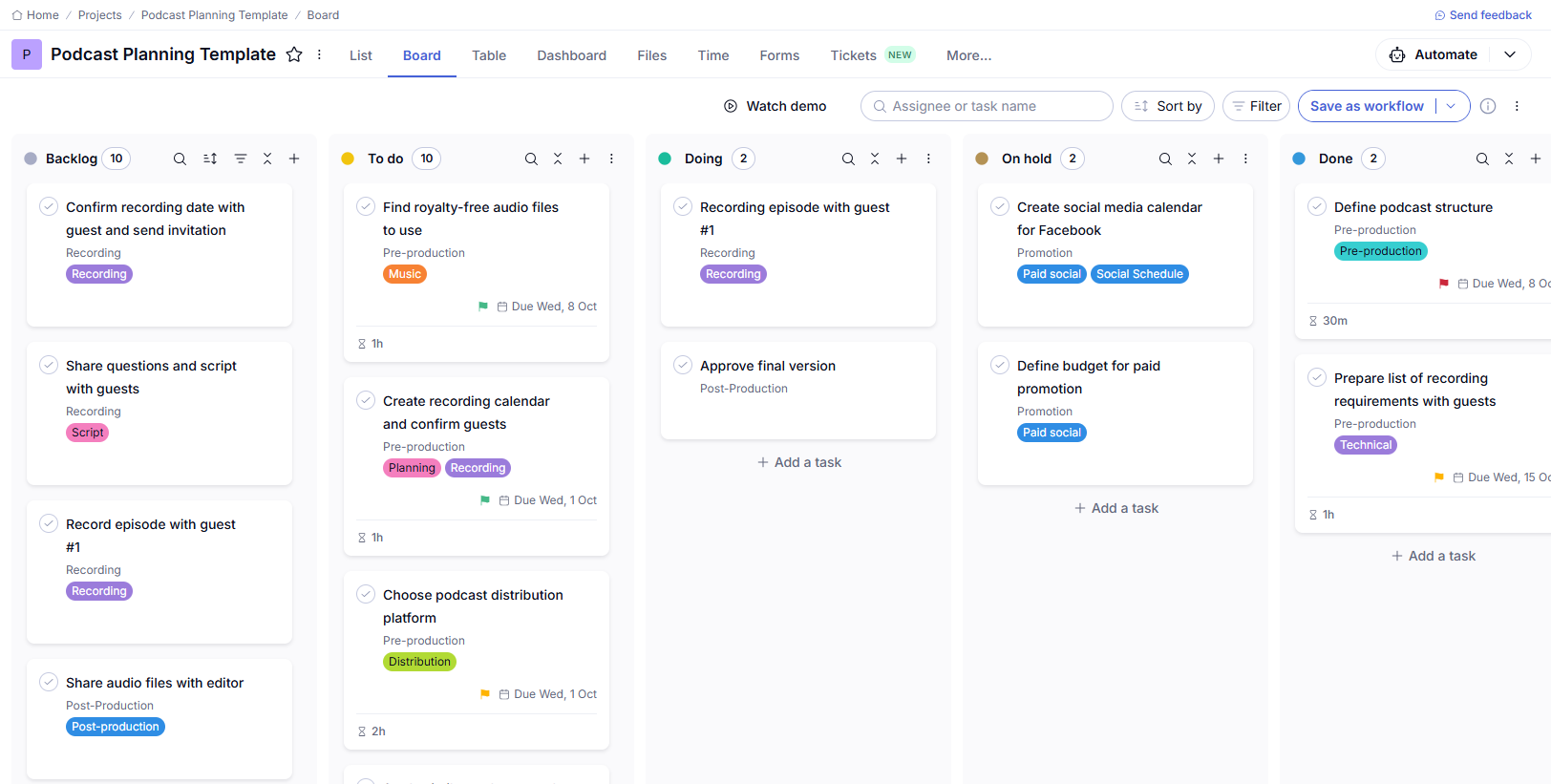
Teamwork interface optimized for agencies, with time tracking, billing, and client collaboration features.
Teamwork’s interface is agency-focused and optimized for managing client projects, time tracking, and workflows designed around billable work. Organizing work is easy for those familiar with this environment.
Best for: Client-driven teams of all sizes from small and medium-sized agencies, consultancies, professional services, and marketing firms up to enterprise level.
The free plan includes five users and 100 automations/month.
Paid plans (billed annually):
Deliver: $10.99/user/month
Grow: $19.99/user/month
Scale: Custom pricing
Enterprise: Custom pricing
A 30-day free trial is available.
VERDICT: Strong Trello alternative options for agencies and consultancies that need an all-in-one project management and billing solution.
Kanbanchi’s flexibility, suitability for a wide range of team sizes, and built-in design for Google environments make it the standout choice as the best Trello alternative for teams deeply embedded in the Google Workspace ecosystem.
It offers deep integration and seamless workflow within Google, with a user-friendly Kanban approach that most users will pick up in 15 minutes or so.
While its mobile app is not as advanced as the Trello option, most other functionality provided by Trello is well-covered by Kanbanchi, with the added features of native integration with Drive, Gmail, and Calendar. Simply roll it out to all users in your organization from the Google Admin Console.
Kanbanchi is backed by excellent user reviews, offering additional features to Trello like time-tracking, robust offline connectivity, and multiple support options, with human agents available.
To make migration from Trello to Kanbanchi simple, simply import your Trello Boards directly to Kanbanchi or import from CSV. Start with a free trial of Kanbanchi today!
In this Article:
Start using Kanbanchi now
Start your free trial